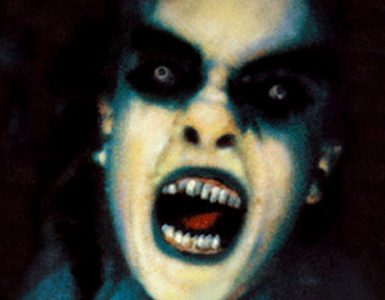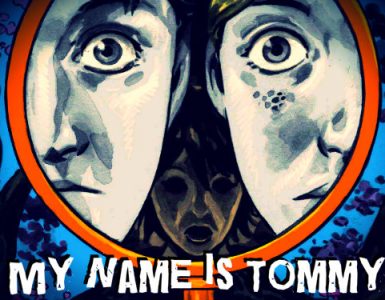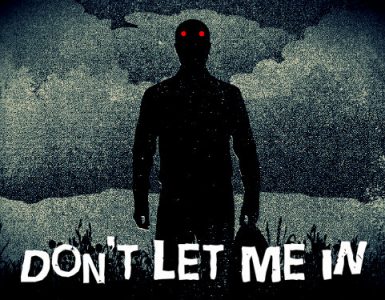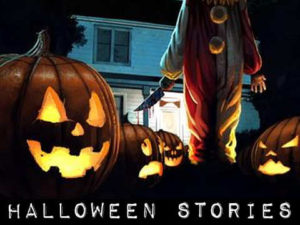The Middle Bedroom is a classic ghost story written by Henry to Henry De Vere Stacpoole in 1918. It’s set in Ireland and tells the story of a family who move into an old house that is believed to be haunted by the ghost of its previous tenant, an old recluse nicknamed “The Spider”.

Are all living creatures represented in the human race, so that we find shark men — or, at least, men with the instincts of sharks — sloth men, cat men, tiger men, and so on? Le Brun started the idea, I believe, and I take it up as bearing on the case of Sir Michael Carey, of Carey House, near Innis Town, on the west coast of Ireland.
I would ask another question before starting on my story: If a man were to give way to his natural instincts and retire from the world would he develop, or, rather, degenerate, along the line of his main instinct? Who can say? I only know that Sir Michael, the builder of the house that took his name, was known a hundred years ago amongst the illiterate peasantry as ” the spider,” that so dubbed on account of his mentality and general make-up, he lived alone in his house like a spider in a gloomy corner, that, according to legend, the devil came and took him one dark night, leaving neither rag nor bone of him and that his ghost was reputed to haunt Carey House and the country round, ever after.
The next of kin, Mr. Massy Pope, tried to live in the house. He left suddenly on account of the “loneliness” of the situation and succeeded in letting the place, with the shooting and fishing rights, to a hard-headed Englishman named Doubleday.
Doubleday didn’t believe in ghosts nor care about them, snipe was his game and cock; he was a two-bottle man — it was in 1863 — and if he had met with a ghost any time after ten o’clock he would scarcely have seen it, or seeing it, would not have cared. But his servants were the trouble. They left one day in a body, being softheaded folk and unfortified and having a very good reason of their own. Then some years elapsed and the story of the next let, as told to me by Micky Feelan one day, out shooting, was as follows:
“When Mr. Doubleday had gone, sor, the house laid empty, spilin’ the country for miles round, not a man would go into the groun’s to trap a rabbit nor a woman enter its doors to lift a window, and Mr. Pope squanderin’ his money to advertise it. That’s the man he was, he wouldn’t be bet by it, rowlin’ in riches what did it matter to him whether it lay let or empty, not a brass farthin’, but lie wouldn’t be bet by it, it was like a horse that wouldn’t rise at a ditch and he’d canther it back and try it again and lather it over the head, squanderin’ his money in the advertisin’ till all of a sudden he got a rise out of a family be name of Leftwidge.
“Dublin people they were, with a grocer’s shop in old Fishamble Street. There was a dozen of them, mostly childer and one red-headed strip of a girl to do the cookin’. Twenty pound a year was the rent, I’ve heard tell, and they lived mostly be trappin’ rabbits, the boys doin’ a bit of fishin’ and the groceries comin’ from the shop where the ould father stuck at work in his shin sleeves while the rest of the lot was airin’ themselves in the counthry.
“Be jabers, they were a crowd, ghosts! Little they cared about ghosts shamblin’ about widout shoes or stockin’s and the boys wid their sticks and catapults killin’ hens be the sly and maltreatin’ the country boys like Red Injuns, the shame of the county.
“Norah Driscol was the name of the redheaded slip and many a time me mother has seen her wid her apron over her head rockin’ and cryin’ wid the treatment of them boys and the botheration of the rest of them, for there was a matter of a dozen or more, rangin’ like the pipes of an organ from Micky the eldest son six fut and as thin as a gas pipe, to Pat the youngest not the height of your knee.
“Well, sor, the ghost lay aisy at the sight of the lot of them and didn’t let a word out of it for a full month. Then one day, Norah Driscoll was goin’ along the top flure passage whin the band begin to play. The bedrooms was mostly on that passage and the house agent had warned them against havin’ anythin’ to do with the middle most bedroom, for, says he, there’s rats there that can’t be got rid of and that’s the cause of all the trouble in the lettin’ of the house, says he. It would be a hundred and twenty a year rent, only for them rats, says he, so they’re worth a hundred a year to you if you just keep the door shut and don’t bother about the noises they do be makin’ at odd times — sometimes it’s like as if they was sneezin’ and blowin’ their noses and sometimes it’s like as if they was walkin’ about with their brogues on and sometimes it’s like as if they was cursin’ and swearin’. Don’t you mind them, he says, but keep sayin’ over and over to yourself they’re worth a hundred a year to me. That’s what he tould Mrs. Leftwidge.
“Well, sor, Norah was moonin’ along the passage, sent to fetch a duster or somethin’ when she opened the dure of the middle bedroom be mistake. There was no furniture in it, not as much as a three-legged stool and the blind was down, but a shaft of the sun struck through be the side of the blind and there in the middle of the (lure was sittin’ a little old man dressed as they was dressed a hundred years ago in an ould brown coat wid brass buttons and all and the face of him wider his hat topped the sight of him, for Norah said it wasn’t a face, but more like one of those masks the childer make out of a bit of paper with holes in it.
“The screech she let out of her as she banged the dure to, brought the family runnin’ from downstairs, and the boys slammed open the door to get at the chap but there wasn’t a speck of him.
“It’s a rat she saw,’ says Mrs. Leftwidge, ‘Downstairs wid the lot of you or I’ll give you the linth of me slipper — and open that dure again if you dare.’
“Down they went, Norah bawlin’ and the old woman pushin’ her and nothin’ more happened that day till the night. Half a dozen of the little ones slep’ in the same room with their mother to save the light and be under control and gettin’ on for twelve o’clock the old woman, snorin’ wid her mouth wide, was woke from her slape be one of the childer.
“‘Mummy,’ says he, ‘listen to the bagpipes.’ She lifted herself on her elbow, but, faith, she could have heard it with her head under the clothes, for the dhrone of the pipes filled the house comin’ from the middle bedroom.
“Next minit the whole lither of them was in the passage, the old woman with a gutherin’ candle in her hand, and as they stood there keepin’ time with their teeth to the tune of the pipes, the noise of it suddenly let off and the handle of the middle bedroom dure began to turn.
“They didn’t wait to see what was comin’ out; no, your honor, you may bet your life they didn’t, they was half of them under their beds the linth of that night and next mornin’ they began to pack to go back to Dublin, gettin’ their old traps together and strippin’ the garden to take back wid them in hampers. Micky, the second boy, was sent runnin’ to hire two cars to take them to the station, for the railway in those days had just come to Drutnboyne, twelve miles away, and whilst he was gone they tore up the potatoes and cut the cabbages and faith they’d have taken the flurin’ away if they’d had manes to shift it.
“Well, there they were strapped and ready to go when Mrs. Left-widge, sittin’ in her bonnet on the boxes and atin’ a sandwidge, sud-denly stops her chewin’ and looks about her like a hen countin’ her chickens:
“‘Where’s Pat?’ says she.
“Pat was the youngest, as I’ve tould you, sor, a bit of a chap in pet-ticoats, no size at all and always gettin’ astray.
“I don’t know,’ says one of the boys, ‘but faith, I hear him shoutin’ somewhere upstairs.’
“Upstairs they all rushed led be the woman and they hadn’t no sooner reached the top passage than they seen Pat bein’ whisked through the open dure of the middle bedroom, dragged along be some-body’s hand, and when they reached the dure, there was Pat bein’ dragged up the chimney.
“It was one of them big ould chimneys a man could go up, and the heels of the child was disappearin’ when Mrs. Leftwidge lays hold of a fut and pulls, bawlin’ murder Irish, till the thing in the chimney let go its holt and Pat comes into the grate, kickin’ like a pup in the shtrangles and liftin’ the roof off with the hullabaloo of him.
“She tuck him be one fut like a turkey and down she runs with him and into the garden and there when they’d soothed him he gives his story, how he’d been playin’ in the passage when a little ould man, the funniest ould man he’d ever seen pokes his head out of the bedroom dure. Pat, poor divil, bein’ sated at his play couldn’t get his legs under him wid the fright, he could only sit and shout whilst the head of the little ould man pops in and out of the dureway like the head of a tortoise from its shell.
“Then out he comes the whole of him and grabs the child be the hand and whisks him off into the bedroom and goes up the chimney heels and first haulin’ Pat after him. Goes up like a spider.
“Well, they was sittin’ about on the boxes they’d hauled out of the house waitin’ for the cars and tryin’ to squeeze more of the news out of Pat, when up comes the cars wid Sergeant Rafferty and Constable O’Halloran on wan of them, to see they weren’t takin’ the house away wid them — they’d got that bad name in the county.
“And when the sergeant heard the story, up he went to the bedroom and down he comes again.
“‘Here,’ says he to O’Halloran, ‘take this lot off to the train and go to the barracks and fetch me two carbines wid buck shot ca’tridges —the same ould Forster used to shoot the boys with, bad luck to him —and look slippy,’ says he, ‘for I’m a brave man, but I don’t want to be no longer here be myself than’s needful.’
“Off the cars went wid the family packed like flies on them an’ in a matter of a couple of hours back comes the constable wid the guns. Up they go to the bedroom.
“‘Stick your head up the chimney,’ says the sergeant.
“‘I’ll be — if do,’ says the other.
“‘Well, then, shut it,’ says the sergeant, `and keep still.’
“They listened but they didn’t hear nothing at all. Then the sergeant begins talkin’ in a loud voice, winkin’ at the other.
“‘There’s nothin’ there,’ says he, ‘it was a ghost they saw and it’s gettin’ oneasy I am meself. Let’s get off back to Drumboyne and have a glass and lave the ould house to look afther itself.’
“I’m wid you,’ says the constable and downstairs they tramped, makin’ as much noise wid their big boots as a rigiment of soldiers. Then in the hall they sits down and begins takin’ off their boots.
“‘All the same,’ says the constable as he pulled the laces, I’d be just as aisy in me mind if I was three miles off trampin’ on the road to Drumboyne.’
“‘So would I,’ says the sergeant, and it’s there I’d be only I’m thinkin’ of promotion.’
“I’m thinkin’ of ghosts,’ says the constable wid the boot-lace in his hand.
“`Go on unlacin’ your boots,’ says the other, ‘and don’t be a keyoward, this is no ghost. Ghosts can’t pull childer up chimneys.’
“‘Faith, you seem to know a lot about them,’ says the constable, but it’s I that am thinkin’ it’s holy water and Father Mooney ought to be on this job instead of you and me and guns.’
“‘And how would you get holy water up the chimney?’ axes the sergeant.
“‘Wit a squirt,’ replies him, and how else?”
“‘Squirt yourself out of them boots,’ says the sergeant, ‘or it’s me ramrod I’ll take to you, and now follow me,’ he says, ‘and walk soft.’
“Wid the loaded guns in their hands up they whit makin’ no more sound than shaddas in a wall, and when they got to the room down they squats one on each side of the chimney.
“They hears nothin’ for a while, but the ticldn’ of the sergeant’s watch and the sounds of their own hearts goin’ lub-a-dub. Then comes a cough. It wasn’t a right sort of cough, for, let alone that it was comin’ down a chimney, it sounded to be the cough of a chap that had died for want of water and lain in a brick kiln afther.
“The constable said next day he’d have been up and off only the sound cut the legs from under him, the sergeant wasn’t much better and there they sat sayin’ their prayers and listenin’ for more.
“They waited near an hour hearin’ nothin’, and then all at once began a noise, a scratchin’ and a scrabblin’ like a cat comin’ down a drain pipe.
“‘It’s comin’ down,’ shouts the constable.
“`Begob it’s not,’ says the sergeant and wid that he shoves the muzzle of his gun up the flue and fires.
“He fired from fright to keep it up, so he said at the inquest, but, lie jabers, he brought it down like a cock pheasant, tumblin’ and clawin’ and when they stretched it out on the flure it was a man right enough. A bit of an ould man as brown as a spider, and there he lay dead as a grouse wid the buckshot holes in him and not a drop of blood no more than if he’d been made of cardboard.
“‘Cover the face of him,’ says the constable, for that was the sort of face he had, better than I can tell you, and havin’ nothin’ to cover it they turned him face down, and made off runnin’ to Drumboyne for the residint magistrit.
“Well, sor, when they took that chimney down they found a room off it, all littered with bones and birds’ feathers and rats’ tails. It wouldn’t do to be tellin’ you of that room, more than it had no winda to it and had been built on purpose be Sir Michael Carey when he put the house up. He’d took to live in it, for that was the way his heart was, and at long last he took to live nowhere else, and that was how the sergeant brought him down and he must have been a matter of a hundred and tin years of age, they reckoned.
“He had his bagpipes to cheer him and frighten away tinints and he’d be out be nights scavengin’ for food — they say they found the bones of childer in the room, but may be that was a lie got be him tryin’ to drag Pat Leftwidge up the flue — but faith I wouldn’t put it beyond him. For that chap was a spider, sor, they said his face was the face of a spider, and his arms and legs no better.
“He’d begun in the shape of a man, maybe, but the spider in him got the bether of him. Look, there’s all there’s left of the house, sor, thin walls beyond the trees. They set a light to it to get shut of that room and if you knew the truth of it all you wouldn’ blame them.”







Add comment